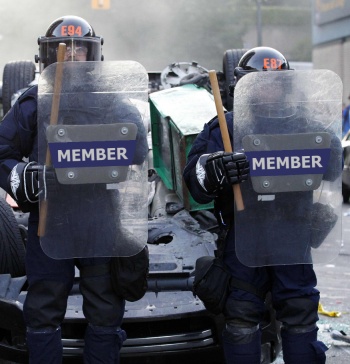Canadian Police PR Ploy – Call Themselves “Members”
 For years I have been studying things like mind control, propaganda techniques, deception, symbolism, corruption, and most recently how the language of legislation (legalese) is used to facilitate the previous things on my list. I have massive amounts of data and info on this, spent countless hours deciphering it all and exposing the truths in the data, so I feel confident that I may have useful insights to share with you over time on how the ruling superclass works. The following is just one of the observations I’ve made.
For years I have been studying things like mind control, propaganda techniques, deception, symbolism, corruption, and most recently how the language of legislation (legalese) is used to facilitate the previous things on my list. I have massive amounts of data and info on this, spent countless hours deciphering it all and exposing the truths in the data, so I feel confident that I may have useful insights to share with you over time on how the ruling superclass works. The following is just one of the observations I’ve made.
I’ve been noticing that in the newspapers here in my part of Canada, journalists sometimes refer to police officers as “members“, while in other articles they call them police, RCMP or or some other official title. So I started digging in deeper by researching more than a hundred articles on different newspaper’s web sites and have spotted a trend: When the article reports on something that the police may be held liable for, could be unlawful or that the public may perceive as negative, journalists use the word “member” when referring to the officers involved. But when the article reports on something the police do that would be considered positive, they use the words “police, RCMP,” or officers, etc.
In one particular article I read a few weeks back, a paper reported on how 2 cops were driving around a parking lot of a bar at about 2am and they accidently ran over a drunk guy who was passed out on the pavement. The article never connected the two officers in the car with the police. Instead, they said things like “while entering the parking lot, a member noticed the car may have ran over something, the other member stopped the vehicle and got out to investivgate…” etc. It made the article very awkward to read; almost senseless.
But when the cops raid a growhouse or investigate a bomb threat, the article glorifies them “Constable so-and-so was the first on the scene and Seargent Dickwad estimates 40 kilos of cannibas was recovered” etc.
Calling the police “members” disconnects the mind of the reader from any police wrongdoing by purposely not referring to the cops by their official titles. That, combined with the second example glorifying the police gives a lopsided view of the police to the public, who are dumbed down enough by the status-quo that they don’t notice they are being programmed by a propaganda technique. Also, by disconnecting the title of police or other official titles from the wrongdoing, it may have some legal significance and may somehow protect the police “members” and their puppet masters from liability. Although, I would have to look into that last bit more before I could say so with any degree of certainty.
But I can and will say this with certainty – it keeps the wrongdoing under the radar in the public record by making the story benign, and now in the digital age, really hard to find in search engines. It’s hard to find an article about police wrongding in a search engine if they’re using a nondescript word like “member” to refer to themselves in connection with something negative.
To serve and protect… themselves.
By Paul Short on 11/07/2012









